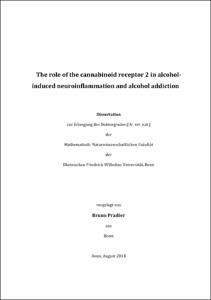Pradier, Bruno: The role of the cannabinoid receptor 2 in alcohol-induced neuroinflammation and alcohol addiction. - Bonn, 2015. - Dissertation, Rheinische Friedrich-Wilhelms-Universität Bonn.
Online-Ausgabe in bonndoc: https://nbn-resolving.org/urn:nbn:de:hbz:5n-39028
Online-Ausgabe in bonndoc: https://nbn-resolving.org/urn:nbn:de:hbz:5n-39028
@phdthesis{handle:20.500.11811/6411,
urn: https://nbn-resolving.org/urn:nbn:de:hbz:5n-39028,
author = {{Bruno Pradier}},
title = {The role of the cannabinoid receptor 2 in alcohol-induced neuroinflammation and alcohol addiction},
school = {Rheinische Friedrich-Wilhelms-Universität Bonn},
year = 2015,
month = feb,
note = {Chronic alcohol abuse leads to severe brain damage, which has been associated with alcohol-induced neuroinflammation. Recently, the cannabinoid receptor 2 (CB2), which is predominantly expressed on immune cells, has been shown to be involved in alcohol addiction. Therefore, this study aimed at investigating the role of the CB2 in alcoholinduced neuroinflammation and at characterising alcohol-related behaviour in CB2 knockout animals. First, the potency of different chronic alcohol models to induce neuroinflammation was analysed. To achieve this, levels of pro- and anti-inflammatory cytokines and glial activation markers were quantified in the cortex of the animals using ELISA and immuno-histochemical approaches. Next, we characterised the modulatory role of the CB2 receptor in alcohol-induced neuroinflammation. We hypothesised that lack of CB2 should be beneficial in alcohol-induced neuroinflammation. Therefore, the neuroinflammatory burden after chronic alcohol consumption was analysed in CB2 deficient animals compared to WT controls. We can conclude that long-term models applied in this study led to neuroinflammation, as revealed by increased expression of pro-inflammatory cytokines. These changes were more pronounced when animals were continuously exposed to alcohol and additionally, we found a strong correlation between the duration of alcohol drinking and the severity of neuroinflammation. In line with this, long-term alcohol drinking led to a pro-inflammatory phenotype of microglia in the cortex. Furthermore, CB2 deficiency dampens the inflammatory response in the cortex. However, this effect was strongly dependent on housing conditions. In a second approach, the alcohol drinking pattern of CB2 deficient animals was analysed in different models that included environmental factors like social isolation, repeated withdrawal of alcohol or foot shock-induced stress. Finally, the development of tolerance, somatic signs of withdrawal and alcohol clearance were characterised in these mice. Interestingly, we detected that the CB2 receptor increased alcohol drinking in a model for social drinking. Additionally, our data suggest that the CB2 receptor modulates alcohol reward. Taken together, these data show that the CB2 receptor is involved in a variety of alcohol-related phenotypes ranging from alcohol-induced neuroinflammation to alcohol reward. In addition, the function of this receptor is strongly modulated by the environment.},
url = {https://hdl.handle.net/20.500.11811/6411}
}
urn: https://nbn-resolving.org/urn:nbn:de:hbz:5n-39028,
author = {{Bruno Pradier}},
title = {The role of the cannabinoid receptor 2 in alcohol-induced neuroinflammation and alcohol addiction},
school = {Rheinische Friedrich-Wilhelms-Universität Bonn},
year = 2015,
month = feb,
note = {Chronic alcohol abuse leads to severe brain damage, which has been associated with alcohol-induced neuroinflammation. Recently, the cannabinoid receptor 2 (CB2), which is predominantly expressed on immune cells, has been shown to be involved in alcohol addiction. Therefore, this study aimed at investigating the role of the CB2 in alcoholinduced neuroinflammation and at characterising alcohol-related behaviour in CB2 knockout animals. First, the potency of different chronic alcohol models to induce neuroinflammation was analysed. To achieve this, levels of pro- and anti-inflammatory cytokines and glial activation markers were quantified in the cortex of the animals using ELISA and immuno-histochemical approaches. Next, we characterised the modulatory role of the CB2 receptor in alcohol-induced neuroinflammation. We hypothesised that lack of CB2 should be beneficial in alcohol-induced neuroinflammation. Therefore, the neuroinflammatory burden after chronic alcohol consumption was analysed in CB2 deficient animals compared to WT controls. We can conclude that long-term models applied in this study led to neuroinflammation, as revealed by increased expression of pro-inflammatory cytokines. These changes were more pronounced when animals were continuously exposed to alcohol and additionally, we found a strong correlation between the duration of alcohol drinking and the severity of neuroinflammation. In line with this, long-term alcohol drinking led to a pro-inflammatory phenotype of microglia in the cortex. Furthermore, CB2 deficiency dampens the inflammatory response in the cortex. However, this effect was strongly dependent on housing conditions. In a second approach, the alcohol drinking pattern of CB2 deficient animals was analysed in different models that included environmental factors like social isolation, repeated withdrawal of alcohol or foot shock-induced stress. Finally, the development of tolerance, somatic signs of withdrawal and alcohol clearance were characterised in these mice. Interestingly, we detected that the CB2 receptor increased alcohol drinking in a model for social drinking. Additionally, our data suggest that the CB2 receptor modulates alcohol reward. Taken together, these data show that the CB2 receptor is involved in a variety of alcohol-related phenotypes ranging from alcohol-induced neuroinflammation to alcohol reward. In addition, the function of this receptor is strongly modulated by the environment.},
url = {https://hdl.handle.net/20.500.11811/6411}
}






